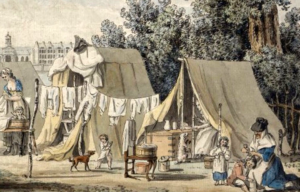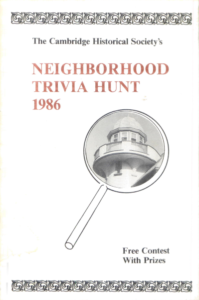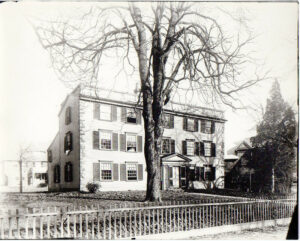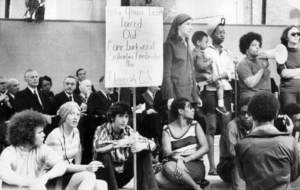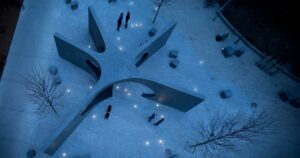The Window Shop
Compiled by Deb Mandel, 2022
Years
1939 – 1972
Locations
37 Church St. (May 2, 1939-Nov. 1939)
102 Mt. Auburn St. (Nov. 1939-1947)
56 Brattle St. (1947-1972)
History
A small group of philanthropic-minded Cambridge women opened The Window Shop on the second floor of 37 Church St. in Harvard Square in 1939. One of these women was Elsa Brändström Ulich, a Swedish immigrant and Red Cross worker, known as “the angel of Siberia” for her work with ill and destitute prisoners of war in Russia and Siberia during WWI. The Shop provided work opportunities and aid to German, Austrian, and other refugees who fled Hitler to seek new lives in America. The refugees did whatever they could, from baking to consignment and sewing. Later, it was Hungarian freedom fighters who sought employment there, followed by African Americans, who moved from the South to the North during the civil rights movement. It became one of the few businesses in Cambridge to hire African Americans.
The women employed refugees who did whatever they could, from sewing to consignment to baking. It became a favorite hangout for many, including the newly-naturalized architect, Walter Gropius, who began teaching at Harvard in 1937.
The original one-room operation had a large window and not much else, thus the name. Its larger quarters on Mt. Auburn Street created space for serving authentic Viennese pastries like Linzer cakes and Mozart tortes.
In 1947, the Window Shop relocated to its final home at 56 Brattle St. where it opened a multi-level restaurant, bakery and outdoor patio. European comfort food, such as goulash and schnitzel was served there. The c.1808 Federal-style house was once The Cock Horse Inn and Dexter Pratt’s blacksmith shop, made famous in the 1841 Longfellow Poem “The Village Blacksmith.”
One could buy turkeys, ducks and hams cooked in their kitchen, delicious casseroles, and Lasagna Napolitaine, an Italian noodle and cheese dish. In March 1956 the opening of a refurbished restaurant and new gift shop was celebrated and regularly displayed artwork from the Cambridge Art Association. In December, 1959 The Window Shop was one of five Cambridge eating establishments to receive national recognition in the Silver Anniversary Edition of the Duncan Hines Travel Book “Adventures in Good Eating.”
In 1971, Mrs. Michael B. Bever, president of The Window Shop, appointed a new manager to The Window Shop’s restaurant, Mr. Guy Greco, and a new gourmet chef, Mr. Henry Beauvais, both formerly associated with Locke-Obers Restaurant in Boston. As styles changed and chefs left, the Window Shop’s popularity waned and it closed in 1972.
Over the years, The Window Shop became the Blacksmith House, Hi-Rise Bakery, and Cambridge Center for Adult Education.
Sources
Books
Lotman, Mo. Harvard Square: An Illustrated History Since 1950. New York, Stewart, Tabori & Chang. 2009.
Miller, Ellen J., et al. The Window Shop: Safe Harbor for Refugees, 1939-1972. Universe, 2007.
Articles
“25 years ago.” The Cambridge Chronicle, 8 March 1973, p. 8.
Colgate, Mabel. “Art Association Standbys In Heart-Warming Exhibit.” The Cambridge Chronicle, 23 November 1961, p.11.
“Community Project Honors Women of the Window Shop.” The Cambridge Chronicle, 25 March 2004, p.24.
“Duncan Hines Approves Five Places Here.” The Cambridge Chronicle, 3 December 1959, p.15.
Grieco, Kristen. “A Refuge in the Square.” The Cambridge Chronicle, 15 February 2007, p.23. (photo by Mark Thomson)
“Harvard Square Window Shop Restaurant Has New Management.” The Cambridge Chronicle, 11 March 1971, p.13.
“In Cambridge.” The Cambridge Chronicle, 9 February 1956, p.2.
“Window Shop Has Now Gift Shop And Restaurant.” The Cambridge Chronicle, 22 March 1956, p.5.
“Window Shop Holds Open House at Its New Location Here.” The Cambridge Chronicle, 20 March 1947, p.21.
Archives and Image Collections
Hollis Library, Harvard University. 57 Images.
Hollis Library, Harvard University. Records of the Cambridge Home Information Center, 1942- 1975.
Hollis Library, Harvard University. Ten Photographs Depicting Members of the Cambridge Home Information Center Demonstrating Canning. 1942-1944.
Website
Mosely, Eva. “The Absolute Majority of the Population”: Women in Twentieth-Century Cambridge.” Cambridge MA, History Cambridge. Last Accessed 13 July 2022.

